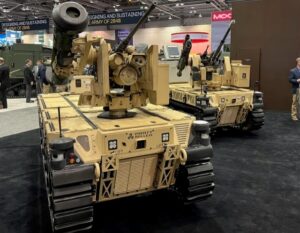HUNTSVILLE, Ala. — The Army has released a Request for Prototype Proposals (RPP) for its Robotic Combat Vehicle program, detailing a three-phased effort that will start with selecting up to four vendors to deliver test vehicles by August 2024.
Following the RPP release on Wednesday morning, Oshkosh Defense
[OSK] and BAE Systems confirmed their interest in the RCV effort, which could culminate in a production contract worth around $607 million for 211 robotic vehicles.

The new RCV prototyping effort follows the Army’s testing the last few years with prototype vehicles in light and medium variants, to include a solution from QinetiQ and Oshkosh Defense’s Pratt Miller, which went into informing requirements for the newly detailed formal program.
Doug Bush, the Army’s top acquisition official, confirmed last July the Army plans to move ahead for now with a focus on developing the light variant, the RCV-L, which is reflected in Wednesday’s RPP (Defense Daily, Aug. 3).
The first phase for the RCV effort includes awarding deals worth up to $13.8 million to no more than four vendors, with each firm tasked with delivering two platforms.
The Army will then select one vendor from that group for a second phase, which is expected to be valued at $118.9 million and cover delivery of nine full-system prototypes.
A potential $607 million follow-on production contract may follow, with the Army noting the deal could be awarded “without the use of competitive procedures, so long as the participant in this transaction successfully completes the prototype project.”
Pat Williams, Oshkosh Defense’s chief program officer, told Defense Daily the company’s participation in the initial testing phase has informed the company’s forthcoming proposal for the RCV prototyping program.
“They give the soldiers the capability to go and play with it and to use it in operational scenarios. They got that soldier feedback to inform the design and the requirements for how it will eventually be employed. So that is what’s been going on for the last couple of years,” Williams said during an interview at the Association of the United States Army’s Global Force Symposium in Huntsville, Alabama. “We’ve got a couple of years now of no-kidding hands-on testing with our government customer and the soldiers that’ll inform our design for what we propose for this RPP.”
Oshkosh Defense brought two RCVs to this week’s conference, to include one displayed with the Kongsberg CROWS-J with an M2 .50 caliber machine gun and the Hoverfly tethered drone and another with a Kongsberg RS6 Remote Weapon Station equipped with an XM913 30x113mm cannon, which have been used in recent the test period with the Army.
“It’s not necessarily what we’ll be proposing. I can’t get too much into what we’re proposing,” Williams said. “But we spent a couple years testing these things and getting input that informed our design. We iterated our design to incorporate that feedback.”
Jim Miller, BAE Systems’ vice president of business development, also confirmed the company’s interest in the Army’s RCV effort during a media briefing at the AUSA conference and said it has “four or five designs” it could respond with to the RPP.
“We are interested in all things autonomy and all things RCV. So the answer is yes, we are very interested,” Miller told reporters. “We are looking at pursuing. There’s a business decision that has to be made.”
BAE Systems previously unveiled its Robotic Technology Demonstrator platform in October 2019, and Miller on Wednesday noted several efforts the system has participated in over the last few years (Defense Daily, Oct. 15 2019).
“We’ve done a lot lately. We had the Robotic Technology Demonstrator at shows before. We had it at Project Convergence. We are working very closely with the AI Task Force on that under contract. And have made progress on that. We think it’s a very adaptable platform. We just took an M113 and cut the top off of it and put a hybrid-electric bus drive engine in it,” Miller said, adding the platform also fired an Advanced Precision Kill Weapon System during the Army’s EDGE experiment last spring.
The RPP details the Army’s interest in a base configuration of RCV with a CROWS-J and a tethered drone that weighs less than 21,000 pounds, can be transported on a C-130H and can meet a delivery timeline to Aberdeen Proving Ground in Maryland by August 2024.